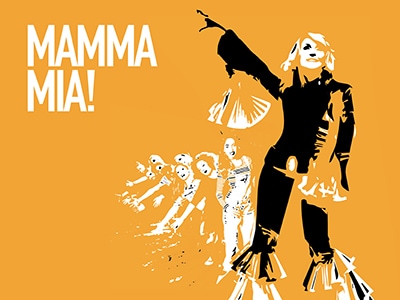

To celebrate the opening of its 70th season, Venice Theater creates a lavish 370th MainStage area premiere production. Though geared to the tastes of VT’s predominantly senior fans, its Mamma Mia! uses plenty of young performers to perform energetically, especially in abundant dances and mimes to 23 ageless ABBA songs. The plot of Mamma Mia! is an extended but simple device to hang music on. Sophie, about to marry Sky, finds her mother Donna’s 21-year-old diary, proving her father must be one of three men. Inviting them to her wedding, she hopes to learn which can walk her down the aisle. The men face what may be their responsibility and, in appearing, get caught up with Donna and her former musical trio pals, Tanya and Ruth. Will there be two marriages and between whom? The leading gals and guys all nicely shuffle in and out of their romantic dilemmas, plans, and new connections between Brad Wages’s abundant dances along with sumptuously choreographed informal movement throughout. The youthful Ensemble dominates, but the elders (played by Lisa Figueroa, Andrea Keddell, Ruth Shaulis) are definitely no slouches. They, like Belle Babcock’s young lead Sophie, sing well too. Except for Beckett Pfanmiller’s winning Sky, Sophie’s fiance, the men who might be her fathers (Chris Caswell, Bill Austin, Ken Basque) understandably exhibit more acting than musical chops. Director Brad Wages has welcomed every excess possible by his technical staff. Tim Wisgerhof’s sets have numerous housing levels and stairways, even on two side stages, along with a center that revolves into an ostentatious bedroom that strangely steps down to an outside side table and chairs. A huge, gaudy symbol of Paris descends at a point of youthful recollection of romance. John Michael Andzulia’s lighting design couldn’t be more complicated or colorful. A back screen changes mostly from light rose to light blue. Full-bulbs of yellow, gold, blue, green, and rose alternate, often flashing, all around the proscenium arch. Spotlighting, sometimes in soft hues, is frequent during solos of song or thought. Basic lights “say” the setting is tropical. A mirrored ball swathed in light descends during a dance. Ordinary sound works well, but the off-stage music is often too loud, making lyrics hard to understand. Costumes by Summer Lee Jack match all the rest of the colors’ and technical excess—except in Lisa Figueroa’s Donna’s musical performance numbers and wedding where her dressing seems shabby. Fabrics and costume design couldn’t be more outlandish than in an extended curtain call that graphically and in length becomes a scene in itself. Venice Theater is extending a perfect appeal to its faithful audiences, volunteer performers, and typical tourists with Mamma Mia. It marks a high point for director and choreographer Brad Wages in his long association with Venice Theater.
